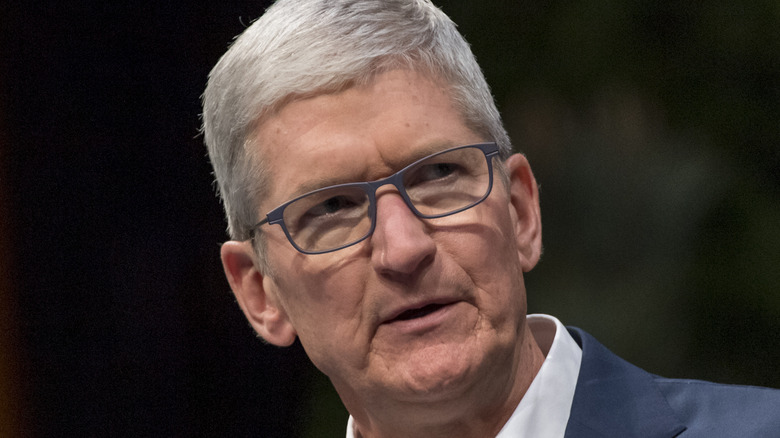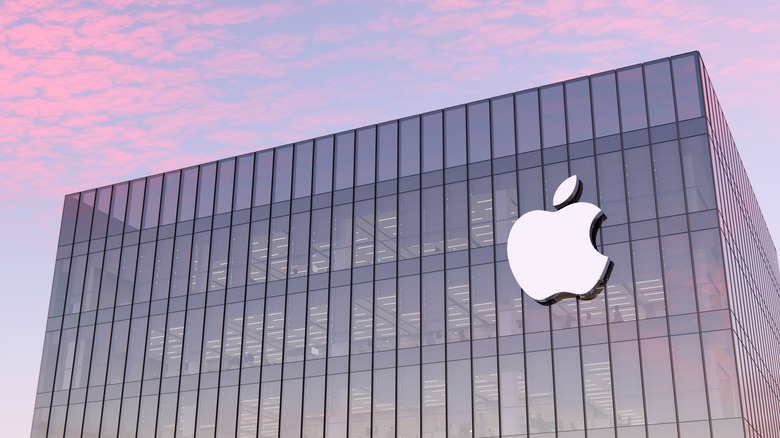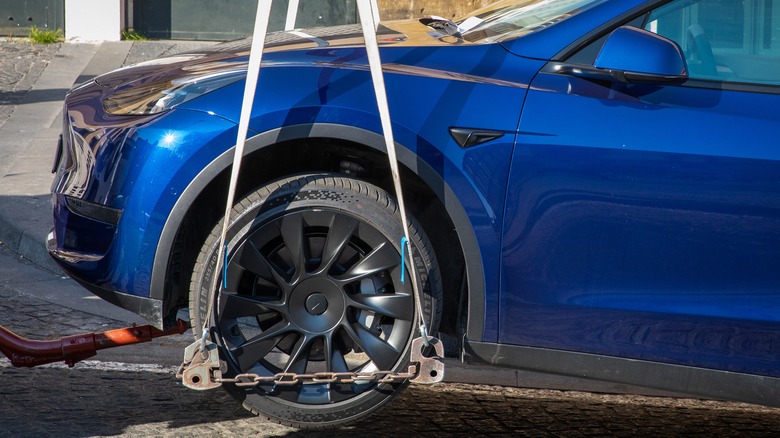The Apple Car's First Test Drive Was A Total Disaster
Several of the automotive and technology industry's biggest names are racing to get the first self-driving car on the road, so it's no surprise Apple, the world's most valuable technology company, has thrown its hat into the ring. Although it is competing with huge names like Tesla, Mercedes, and BMW, Apple has all the tools and pedigree it needs to create a competitive self-driving car. The company has a history of producing highly polished, reliable, user-focused products, so what could go wrong? Well, a lot, apparently.
Apple's car was first rumored back in 2015 with the launch of Project Titan. Those rumors soon became reality as Apple CEO Tim Cook confirmed his company was developing autonomous tech for use in cars. Several partnerships have been formed between automotive manufacturers and tech giants over the years. The names of Apple's collaborators include Volkswagen, while Cook has reportedly courted Nissan, Hyundai-Kia, McLaren, and Chinese electric vehicle manufacturer BYD, according to the Financial Times.
However, it has not been smooth sailing for the Project Titan team. Apple laid off around 200 employees working on the project in 2019 as part of a restructuring. Key figures have also jumped ship to other major companies. Head self-driving engineer Joe Bass left for Meta, while Doug Field — who was also working on the project — decided to jump ship and join Ford. The project was also on the verge of cancelation a number of times, which means its latest struggles could turn out to be the final nail in the coffin for Apple's autonomous driving project. Now news has emerged about the autonomous car's driving abilities. If true, far from being road-ready, Apple's driving AI might actually be a bit dangerous in its present iteration.
Why Apple's self-driving car is different
Apple has a history of doing things differently, and its approach to the self-driving car is no different. While Tesla, Mercedes, and BMW all aim to add self-driving features to what you may recognize as a standard road car, Apple's proposed product may not be what you expect a vehicle to look like. If rumors are to be believed, Apple's fully-autonomous self-driving car will not feature any windows. Instead of watching the actual world roll by as they're chauffeured to their destinations, Apple Car passengers could be looking at a virtual one. The company has filed a patent for a "VR system for use in autonomous vehicles with no windows," and it's easy to speculate where the technology for that patent may end up. The batch of patents the VR system was in also included a display for a VR headset designed to "eliminate accommodation-convergence mismatch problems like headaches, nausea, and eyestrain." VR sickness and travel sickness have very similar root causes, so there is a possibility of Apple removing passengers' views of the outside world in an attempt to increase travel comfort.
Two kinds of Apple self-driving cars are reportedly planned. A semi-autonomous model is allegedly intended to hit the market first, followed by a fully autonomous car. The tech company seems to have a lot of confidence in its fully autonomous model, as it is rumored to completely lack a steering wheel or pedals. Like many Apple products, the self-driving car is expected to target the higher end of the market, putting it in direct competition with most of Tesla's range and other luxury companies like Lucid. Although no details are confirmed, customers should likely expect to pay north of $100,000 for Apple's entry into the self-driving car market.
Apple testing woes could be a huge setback
Several prototypes of Apple's self-driving car were reportedly subject to a test run in Montana last summer. Apparently, the run looked great on the company's drone footage, and executives were said to be understandably impressed. Unfortunately, the drones didn't tell the entire story, at least according to a report from The Information, which claims that Apple's initial test of its self-driving technology did not go as planned. The autonomous car allegedly slammed into curbs, struggled to stay in its lane, and nearly took out a jogger who was crossing the street. The alleged incident with the jogger may have occurred because the AI powering Apple's car did not recognize the pedestrian had right of way.
Still, other companies may have it worse. Tesla, a company that arguably has the closest association with self-driving technology, leads the way in accidents, too. Based on reports automakers have made with U.S. safety regulators, Tesla vehicles were involved in 273 of the close to 400 accidents caused by autonomous driving technology over an 11-month period. The data included crashes that happened while drivers were using features like Traffic Aware Cruise Control, but some of the mishaps occurred while Tesla's Full Self-Driving mode was active (via NPR).
Although self-driving cars aren't illegal in the U.S., their use is heavily regulated in most states. Rigorous safety testing is involved before a self-driving car is approved, so Apple's current effort is probably a long way off. The silicon valley giant reportedly wants to have its cars driving themselves around on public roads by 2025. However, given the difficulties it's supposedly experiencing, the release date may be a little optimistic.


